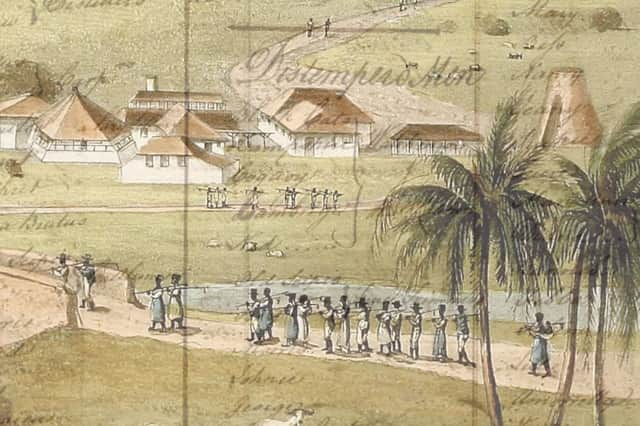Book review: Bought and Sold - Scotland, Jamaica and Slavery, by Kate Phillips


When it comes to the history of empire, Scots are accustomed – if they think of it at all – to seeing themselves as the loyal lieutenants of Britain’s imperial history; the soldiers, missionaries, civil servants and clerks who travelled the world in search of a job or in pursuit of a mission, but whose imperial endeavours meant little to most of the population back home.
The British empire, though was first and foremost a commercial project, and a vast get-rich-quick scheme on a global scale; and Kate Phillips’s comprehensive and sometimes breathtaking study of the intense colonial relationship between Scotland and Jamaica effectively blows apart the idea of Scotland as a mere assistant to that process, demonstrating how much of the economic development of the Scotland we now know, in the 150 years after the Act of Union in 1707, was shaped and enabled by money made in the Caribbean, and by the horrific West African slave trade trade that brought enslaved workers to the islands.
Advertisement
Hide AdPhillips’s book therefore tells the thrilling and often shocking tale of how Scottish companies and entrepreneurs leapt forward, after 1707, to seize the opportunities offered by trade with Britain’s West Indian colonies. Families like the Malcolms of Argyll, the Hamiltons of Ayrshire and the Oswalds of Glasgow soon became major players not only in the notorious triangular trade between the UK, West Africa and the islands, but also in the complex systems of loans, finance and insurance, often using the value of slaves as collateral, that underpinned the trade.
By the late 1700s, it is likely that almost half of the British colonists operating in Jamaica were from Scotland; and they ranged from wealthy estate owners trying to sweat their Jamaican assets to support the luxurious lifestyles of their families back in Scotland, to young men born in poverty who had enough skills and literacy to be able to start a career as an overseer or senior tradesman on a Jamaican estate, and earn enough – such was the demand for labour – to be able to buy land and slaves of their own, and return to Scotland relatively wealthy men. These young single men, given unlimited power over hundreds of slaves of both sexes, fathered many thousands of children on the islands, sometimes bringing them back to Scotland or England to be educated, more often abandoning them completely; and if some of those relationships were affectionate and enduring, many involved rape and sexual coercion of the worst kind.
In the end, of course, the whole Caribbean system came crashing down, as the rotten foundations of the slave economy became more widely known among the British public. By 1800, a full-blown ideological war was being waged, in Scotland and across the UK, between those who argued that Christian and enlightened values forbade the enslavement of fellow human beings, and those so desperate to defend their wealth and privilege that they began – with horrifying political consequences that haunt us still – to try to justify their system by elaborating vicious theories of white racial superiority.
In the end, in 1834, the abolitionists won. Massive compensation was paid to the slave owners; and that summer, The Scotsman advertised for sale “an elegant well executed cheap medal with the figure of a Negro… his head being lifted up towards heaven in expressive gratitude”, so that its readers could celebrate their own magnanimity in finally ending the slave system.
The money, though, remained exactly where it was, in the pockets of those who had benefited most from that abominable trade. Kate Phillips’s book offers a memorably vivid and detailed account of exactly why the nations of the Caribbean will never forget that traumatic history of colonial exploitation; and why, today, many of them are still seeking compensation, for a mighty historic wrong in which Scotland could hardly have been more deeply involved.
Bought and Sold - Scotland, Jamaica and Slavery, by Kate Philips, Luath Press, 353pp, £11.99